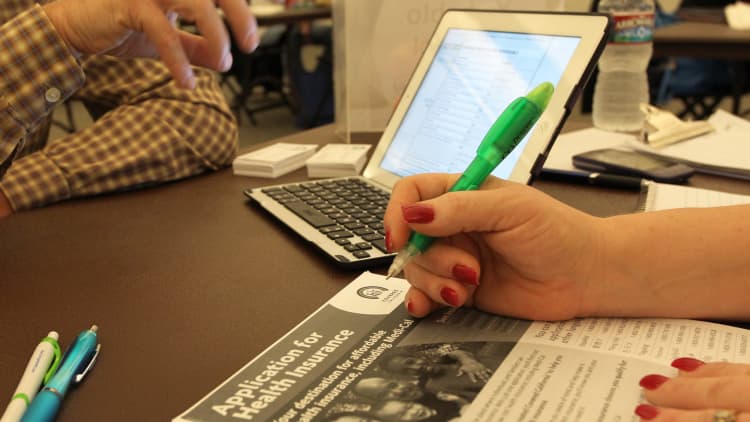
Their businesses might be small, but their share of Obamacare's pie isn't.
One out of every 5 Obamacare customers — 1.4 million people — was a small-business owner, self-employed or both, in 2014, the first year Affordable Care Act plans were available, a government report issued Thursday reveals.
The same Treasury Department report also found that workers whose incomes were not primarily from wages were almost three times more likely to buy health insurance coverage from an Obamacare exchange than wage earners in 2014.
That year, about 28 percent of people who bought coverage for themselves through one of those government-run marketplaces had income that was not primarily from wages, according to the report, the first of its kind to examine participation by those kinds of workers in Obamacare plans.
"Nearly 10 percent of small-business owners and more than 10 percent of gig economy workers got coverage through the Marketplace," wrote two officials at the Treasury and the Health and Human Services Department in a blog post detailing the report.
"These data show that the Affordable Care Act (ACA's) Health Insurance Marketplaces are playing an especially crucial role in providing health coverage to entrepreneurs and other independent workers," the duo wrote.
The report contains state-by-state breakdowns of the number of small-business owners and independent workers covered by ACA plans.
California had more than 480,000 small-business owners and self-employed/sole proprietors covered through those plans, while Florida had almost 290,000 such people covered. States with small populations such as Vermont, Idaho, Montana, Maine, New Hampshire and Rhode Island were among those with a high share of small-business owners relying on Obamacare plans.
The report was issued hours after the Republican-controlled U.S. Senate voted on a budget proposal that is intended to be used to repeal Obamacare, and potentially replace that health-care law with new provisions.
What those new provisions will be, and whether they would come close to maintaining insurance coverage at levels seen under Obamacare, is unclear. About 20 million people have gained coverage under the ACA in the past six years.
The blog post about the report noted that before the ACA became law in 2010, workers without health insurance purchased through a job "often lacked options for affordable coverage."
"Not only did high uninsured rates impede access to care and worsen financial security, but the risk of ending up without health insurance coverage prevented some individuals from striking out on their own," wrote Adam Looney, deputy assistant secretary for tax analysis at the Treasury and Kathryn Martin, acting assistant secretary for planning and evaluation at HHS.
"Experts considered 'job lock,' or individuals' need to stay in an employment situation to maintain health coverage, a significant impediment to entrepreneurship."
The ACA authorized the creation of both government-run exchanges to sell individual health plans as well as federal tax credits to subsidize the purchase of those plans for people with low and moderate incomes.
Thursday's blog post noted that among small-business owners and other independent workers, those with annual incomes below $65,000 were most likely to buy coverage through an Obamacare exchange. A majority of both types of workers have incomes below that level.
The post also said: "Between 2014 and 2015, the number of people who signed up for Marketplace coverage increased by around 50 percent. And enrollment increased further in 2016, and is poised to rise again in 2017."
"Marketplace coverage among independent workers has almost certainly risen as well," the blog post said.
Noah Lang, CEO of Stride Health, a California-based insurance broker that specializes in selling plans to gig workers, said that his initial reaction to the new report was "that the numbers were low, relative to the need."
Gig workers, Lang noted, are three times more likely to be uninsured than the general population.
Lang, whose clients include Uber, Etsy, TaskRabbit and other gig-based companies, said he expected participation in Obamacare plans to increase this year among small-business owners and the self-employed.
"We're seeing a dramatic uptick in enrollment this year because we believe people are getting accustomed to the system, and because we're making it much easier for them to enroll," Lang said. "Gig workers have needed specific guidance when it comes to subsidies. Due to their irregular income, gig workers struggle with subsidy qualification, and they need help claiming appropriate tax deductions."



